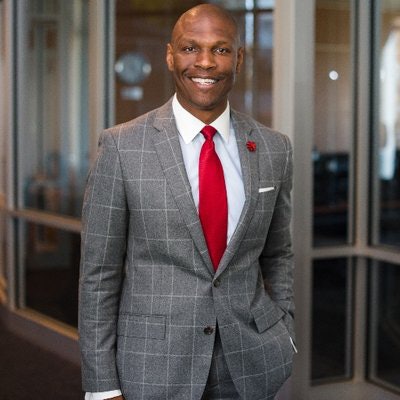An accomplished businessman, Rhodes Scholar and retired Air Force reserve lieutenant colonel, Dr. Christopher B. Howard has moved his institution forward by integrating his prior military experience into his role as the eighth president of Robert Morris University, a private institution in the suburbs of Pittsburgh.
“Even though the military is involved with everything from nation-building to kinetic strikes on enemy forces, it really is, ironically, a people business, a people-driven organization,” he says. “A lot of it has to do with human capital development.”
At RMU, Howard, 49, – one of higher education’s youngest presidents – has committed to doubling the number of military veterans enrolled and he works to make the university a place that promotes students’ holistic well-being.
Translating his military experience to higher education, Howard notes that he has tried to be someone who leads the institution with integrity just as leaders in the military do.
 Dr. Christopher B. Howard
Dr. Christopher B. Howard“You want your airmen to become senior airmen, your lieutenants to become captains,” Howard adds on the commitment to individuals’ development. “The corollary in the academic world is that you want your freshman to become sophomores, sophomores [to] become juniors, assistant professors to become associate professors, directors to become VPs, on down the line.”
The college presidency was not always in sight for Howard, who says he only knew that he wanted to help and serve people growing up. His career aspirations moved between wanting to initially become a fireman, a civil rights attorney, and then ultimately, a military officer.
The path to Howard’s higher education leadership pursuits began when his professor at the U.S. Air Force Academy Colonel Walter Hitchcock and Lieutenant General Michelle D. Johnson encouraged him to apply for the Rhodes Scholarship.
In addition to encouragement from former president of Wofford College Dr. Benjamin B. Dunlap, Howard says a lecture by Dr. Henry Louis “Skip” Gates captivated him while he was at Oxford.
“I had never seen such an urbane African-American man of letters just sitting in front of me,” he recalls. “I was just mesmerized. That kind of wet my whistle.”
Howard earned a bachelor’s degree in political science as a distinguished graduate of the U.S. Air Force Academy in 1991. He later earned a Ph.D. at the University of Oxford as a Rhodes Scholar and an M.B.A. from Harvard Business School.
In the years between his master’s and doctoral education, Howard served as a helicopter pilot, an intelligence officer with the elite Joint Special Operations Command and he received a Bronze Star for his service in Afghanistan in 2003.
Navigating the corporate world, Howard cites his time in Bristol-Myers Squibb’s Corporate Associates Program as having a lasting impact on his career.
“It was a very targeted diversity initiative,” he says. “They really brought me into the corporate world in a very thoughtful and deliberate way.”
Now at RMU, Howard intends to make the school an “exemplar institution” where students of various backgrounds have a pathway to success and can thrive in 21st century professions. Currently, he says 95 percent of students are placed in jobs, graduate school or the military within one year of graduating.
RMU’s strategic plan under Howard’s tenure – RMU 100 – aims to make the institution a preferred strategic partner for corporate and other organizations. Additionally, the plan includes improving RMU’s inclusiveness, rebooting the Communication Skills curriculum and increasing the institution’s alumni contribution rates and net assets.
During Howard’s tenure, RMU completed its largest capitol project – worth nearly $52-million – in the university’s nearly 100-year history. The building of a 140,000-square-foot UPMC Events Center and a Student Recreation Center contributed to the strategic goal of improving RMU’s brand equity and positioning.
The completion of the capitol project came in Howard’s first 18 months at RMU.
“We, as a university, all did it together – faculty, staff, students, board, donors, alumni, local community leaders,” Howard says. “We pulled it off and it represents us going to the next level.”
The university has also rallied behind its “Thrive RMU” initiative, an effort to increase retention and graduation rates for all student groups using predictive data analytics and tailored academic interventions. The Henry L. Hillman Foundation provided a $2-million dollar grant for the initiative and RMU partnered with the EAB and the University Innovation Alliance to further its support of students.
Before arriving at RMU in 2016, Howard served as president of the private, liberal arts school Hampden-Sydney College for six years. His appointments are plenty, and include memberships on the Knight Commission on Intercollegiate Athletics, the Advisory Board of the Morehouse College Research Institute, the Board of Directors of the Allegheny Conference on Community Development and the board of the Olmsted Foundation.
He also serves alongside his wife Barbara Noble Howard as founder and trustee of the Impact Young Lives Foundation.
Howard wants his students to feel that they can reach back to RMU to advance their careers down the line, whether it is through the university’s graduate programs, alumni networks, certificate programs or corporate training initiatives.
“We want to be a lifelong resource and a lifelong learning platform for our graduates and our students,” he says.
Tiffany Pennamon can be reached at [email protected]. You can follow her on Twitter @tiffanypennamon
This article appeared in the May 31 issue of Diverse



















